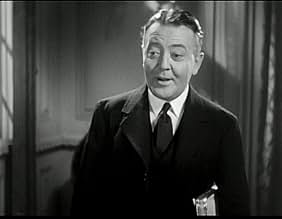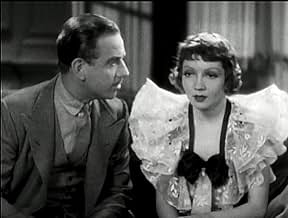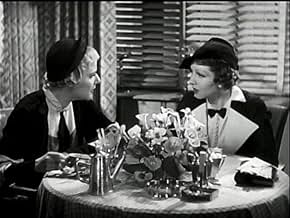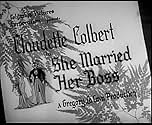An efficient secretary at a department store marries her boss, but discovers that taking care of him at home is a lot different to taking care of him at work.An efficient secretary at a department store marries her boss, but discovers that taking care of him at home is a lot different to taking care of him at work.An efficient secretary at a department store marries her boss, but discovers that taking care of him at home is a lot different to taking care of him at work.
- Director
- Writers
- Stars
- Awards
- 1 win total
Grace Hayle
- Agnes Mayo
- (as Grace Hale)
Ernie Adams
- Passerby
- (uncredited)
William Arnold
- Department Head
- (uncredited)
Lynton Brent
- Assistant Window Dresser
- (uncredited)
Edmund Burns
- Newspaper Photographer
- (uncredited)
A.S. 'Pop' Byron
- Store Watchman
- (uncredited)
- Director
- Writers
- All cast & crew
- Production, box office & more at IMDbPro
Featured reviews
She Married Her Boss is one of those films where the title says it all, no need for any elaboration. Of course the bride is Claudette Colbert who's been crushing out on boss Melvyn Douglas for years.
But before she's a bride Claudette is a secretary and a most efficient one at that. She's got the business well organized, but Douglas's home is something of a shambles with spoiled brat of a daughter Edith Fellows ruling the roost and some crooked household help ripping him off.
So it's a business arrangement that Douglas has in mind when he marries Colbert. But he's slow on the uptake to realize that Colbert has romance in mind. Playboy Michael Bartlett is not slow however and he's got a nice singing voice to go with some oily charm.
Colbert and Douglas get some nice support from folks like Raymond Walburn as the new butler who gets tanked with Douglas, Katharine Alexander as Douglas's snooty sister and Jean Dixon doing the Eve Arden part before Eve Arden was around.
Gregory LaCava directed She Married Her Boss and we're certainly not seeing a director's cut. Harry Cohn's editors at Columbia Pictures butchered this one, the film ends rather abruptly though in truth you know where it all is going. And people who've had loved ones killed by drunk drivers won't find Raymond Walburn careening drunkenly through the streets behind the wheel all that funny.
Still the stars and the planets do shine in She Married Her Boss.
But before she's a bride Claudette is a secretary and a most efficient one at that. She's got the business well organized, but Douglas's home is something of a shambles with spoiled brat of a daughter Edith Fellows ruling the roost and some crooked household help ripping him off.
So it's a business arrangement that Douglas has in mind when he marries Colbert. But he's slow on the uptake to realize that Colbert has romance in mind. Playboy Michael Bartlett is not slow however and he's got a nice singing voice to go with some oily charm.
Colbert and Douglas get some nice support from folks like Raymond Walburn as the new butler who gets tanked with Douglas, Katharine Alexander as Douglas's snooty sister and Jean Dixon doing the Eve Arden part before Eve Arden was around.
Gregory LaCava directed She Married Her Boss and we're certainly not seeing a director's cut. Harry Cohn's editors at Columbia Pictures butchered this one, the film ends rather abruptly though in truth you know where it all is going. And people who've had loved ones killed by drunk drivers won't find Raymond Walburn careening drunkenly through the streets behind the wheel all that funny.
Still the stars and the planets do shine in She Married Her Boss.
Sold as and considered a comedy, SHE MARRIED HER BOSS is actually a light-hearted "women's picture" with only occasional comic moments. Claudette Colbert stars as the executive secretary of department store owner Melvyn Douglas who has secretly been in love with him for seven years although he has never seen her as anything more than a very valuable assistant. Wealthy Douglas lives in a mansion with his frosty, hypochondriac sister Katherine Alexander and his bratty nine-year-old daughter Edith Fellows, product of his one unhappy marriage (it's never stated if Douglas was widowed or divorced but one presumes the latter given the hostile memories both he and Alexander have of his former wife).
Claudette's moneyed pal Jean Dixon is appalled how she is wasting her youth pining for this uninterested man and tries to break her away from him and toward rival store owner Michael Bartlett. When Dixon informs Douglas that Claudette is quitting her job to work for Barlett (untrue), Douglas is desperate to keep her and learns part of the reason is her desire to someday marry, he proposes to a surprised Colbert who happily accepts (the scene is curiously not filmed) only to learn shortly after the marriage that it basically remains little more than a business relationship. Meanwhile Bartlett is not giving in even with Claudette now a married lady (after all he himself is still legally wed!)
This is a pleasant film smoothly directed by Gregory LaCava but it really needed a rewrite and maybe revised casting. Claudette is perfection as always in this type of role but Douglas (whom often comes across as the "dull suitor who loses the girl" in the romantic comedies in which he is actually the "real love" in the picture) fails to show any hint of charm that might have bewitched her all these years although his poorly written character doesn't give him much to work with. The delightful comedienne Jean Dixon - so wonderful as the maid in La Cava's MY MAN GODFREY - is badly cast as Claudette's chic older, sardonic buddy in a part that cries for Helen Broderick.
Edith Fellows, however, is terrific as one of the most realistic brats on screen in the 1930's, a pathological liar who talks back to adults and bullies dogs. Edith's scenes with Claudette as a no-nonsense but warm stepmother tries to reach out to her are extremely believable and sensational. It's also a pleasure to see Grayce Hale, usually cast in unbilled bits as fat and stupid women, given a fairly sizable supporting role as Claudette's assistant at the office that completely lacks the ridicule she usually is given on-screen. Katherine Alexander is acceptable as Douglas' sister and comedian Raymond Walburn (unrecognizable in his early middle-age from his best known period a decade later in movies) is for the most part excellent as the long-suffering butler.
The movie has a shocking lapse of taste in it's use of drunk-driving (by Walburn) as "comedy" (in crowded city streets no less!!) although this may have been a period when the issue was not taken as seriously as it should have been. SHE MARRIED HER BOSS is definitely lesser Colbert but this is one actress who is always worth watching.
Claudette's moneyed pal Jean Dixon is appalled how she is wasting her youth pining for this uninterested man and tries to break her away from him and toward rival store owner Michael Bartlett. When Dixon informs Douglas that Claudette is quitting her job to work for Barlett (untrue), Douglas is desperate to keep her and learns part of the reason is her desire to someday marry, he proposes to a surprised Colbert who happily accepts (the scene is curiously not filmed) only to learn shortly after the marriage that it basically remains little more than a business relationship. Meanwhile Bartlett is not giving in even with Claudette now a married lady (after all he himself is still legally wed!)
This is a pleasant film smoothly directed by Gregory LaCava but it really needed a rewrite and maybe revised casting. Claudette is perfection as always in this type of role but Douglas (whom often comes across as the "dull suitor who loses the girl" in the romantic comedies in which he is actually the "real love" in the picture) fails to show any hint of charm that might have bewitched her all these years although his poorly written character doesn't give him much to work with. The delightful comedienne Jean Dixon - so wonderful as the maid in La Cava's MY MAN GODFREY - is badly cast as Claudette's chic older, sardonic buddy in a part that cries for Helen Broderick.
Edith Fellows, however, is terrific as one of the most realistic brats on screen in the 1930's, a pathological liar who talks back to adults and bullies dogs. Edith's scenes with Claudette as a no-nonsense but warm stepmother tries to reach out to her are extremely believable and sensational. It's also a pleasure to see Grayce Hale, usually cast in unbilled bits as fat and stupid women, given a fairly sizable supporting role as Claudette's assistant at the office that completely lacks the ridicule she usually is given on-screen. Katherine Alexander is acceptable as Douglas' sister and comedian Raymond Walburn (unrecognizable in his early middle-age from his best known period a decade later in movies) is for the most part excellent as the long-suffering butler.
The movie has a shocking lapse of taste in it's use of drunk-driving (by Walburn) as "comedy" (in crowded city streets no less!!) although this may have been a period when the issue was not taken as seriously as it should have been. SHE MARRIED HER BOSS is definitely lesser Colbert but this is one actress who is always worth watching.
Terribly uneven mix of comedy and romantic drama, the script of SHE MARRIED HER BOSS is unworthy of the talents assembled to interpret it. The always reliable Claudette Colbert has to contend with lines like: "Marriage is a woman's real career," as a woman secretly in love with her boss for six years. MELVYN DOUGLAS is the boss, but his part his so poorly written that you have to wonder what Colbert ever sees in him. Nevertheless, he plays it with a flair for this sort of inane comedy.
JEAN DIXON as Colbert's friend and KATHERINE Alexander as Douglas' snooty sister are just cardboard cutouts. And poor EDITH FELLOWS has to play the most insufferable brat since Bonita Granville's turn in THE CHILDREN'S HOUR.
There are various lapses of taste throughout (from today's viewpoint), and the costumes are really the most unflattering female designs ever worn by Colbert in any of her early films. You have to yearn for the Colbert of the '40s (so smartly sophisticated) because she looks downright dowdy in most of her odd wardrobe choices. As I say above, dated in more ways than one.
Not recommended.
JEAN DIXON as Colbert's friend and KATHERINE Alexander as Douglas' snooty sister are just cardboard cutouts. And poor EDITH FELLOWS has to play the most insufferable brat since Bonita Granville's turn in THE CHILDREN'S HOUR.
There are various lapses of taste throughout (from today's viewpoint), and the costumes are really the most unflattering female designs ever worn by Colbert in any of her early films. You have to yearn for the Colbert of the '40s (so smartly sophisticated) because she looks downright dowdy in most of her odd wardrobe choices. As I say above, dated in more ways than one.
Not recommended.
"She Married Her Boss" is a forgotten but alluring Columbia classic, directed by Gregory La Cava, a modest auteur with a flair for upbeat improvisation and delicate touch. La Cava's unassuming touch is less fully evident in this small heartwarming romantic comedy than the director's superior pictures like "Stage Door", "My Man Godfrey", and "Primrose Path".
But "She Married Her Boss" features highly resourceful Claudette Colbert as the competent department store secretary Julia that falls for her boss Richard Barclay (Melvyn Douglas); it also has an unintentionally funny, almost surreal moment involving a department store window and mannequins. As it turns out the film is all Colbert's -- and another reminder what a lovely, divine comedienne Ms. Colbert was. The supporting cast, all wonderful, includes
"She Married Her Boss" is the sort of cuddly classic that works best if you watch it with someone you love or care about.
But "She Married Her Boss" features highly resourceful Claudette Colbert as the competent department store secretary Julia that falls for her boss Richard Barclay (Melvyn Douglas); it also has an unintentionally funny, almost surreal moment involving a department store window and mannequins. As it turns out the film is all Colbert's -- and another reminder what a lovely, divine comedienne Ms. Colbert was. The supporting cast, all wonderful, includes
"She Married Her Boss" is the sort of cuddly classic that works best if you watch it with someone you love or care about.
I used to deal in old-movie memorabilia. In the 1960s, while running a stall in the Portobello Road, I acquired and resold a full-colour poster for 'She Married Her Boss'. What a bizarre piece of artwork! The poster depicted Claudette Colbert with blue eyes, blue hair, and blue skin: she looked a proper Smurfette, or perhaps an Oompa-Loompa. Worse luck, the blue Colbert was placed against a background in the same shade of blue, making her seem to vanish altogether ... except for her lips, which were bright red. For decades, I wanted to view this movie to find out if it was as weird as the poster art.
It turns out to be even weirder. Who designed the costumes here? In the opening scene, Colbert wears a dress with some nice gauntlet cuffs, but it also has a titchy little bow-tie and a pair of lapels the size and shape of an aircraft carrier. In a later scene, Jean Dixon wears an outfit with what appears to be a springboard jutting out of her left shoulder. In the final sequence, Colbert sports raccoon shoulder pads that are so enormous she looks like a linebacker.
This is a screwball comedy, but it's screwier than it needs to be. Michael Bartlett plays a lounge lizard who charms Colbert by telling her she ought to have a mole on her chin. (Ugh!) You know those horribly phony camera set-ups in which an actor sits at a piano keyboard, pumping his elbows, and we're expected to believe he's playing? Bartlett does that here, in one of the fakest versions I've ever seen.
On the positive side, there's a stand-out performance by 12-year-old Edith Fellows as a spoilt brat. Fellows was an immensely talented child actress who had the misfortune to be much less pretty than Shirley Temple, so she got lumbered with Virginia Weidler roles. Colbert hauls Fellows offscreen and gives her a spanking, which would have been funnier if shown on screen. I was delighted by the performance of Raymond Walburn as Melvyn Douglas's butler: amiable, loyal and eventually drunken. Walburn usually played blustering shysters or roguish criminals, so it's a pleasure to see him given this change of pace. Grace Hayle, a character actress whose heavy physique usually cast her in buffoonish roles, is personable here in a nice bit role as Colbert's assistant.
Although the plot is unbelievable (even by screwball comedy standards), individual set pieces are delightful and funny. Colbert and Bartlett host a cocktail party in the shop window of Douglas's department store, with shop dummies as the guests.
The climax of the movie is meant to be funny and romantic, but I found it saddening and maddening. Douglas pretends to abduct Colbert at gunpoint: we know he's faking, but she doesn't and she's evidently terrified. Douglas and Walburn, both drunk to the eyebrows, take Colbert speeding through the city in Douglas's motorcar, the stonkered Walburn at the wheel whilst an undercranked camera shows the car speeding wildly through the streets. I can laugh at comedy based on drunkenness, but it stops being funny when the drunks grab a steering wheel: there have been so many drink-driving tragedies, I just can't laugh at the notion of an inebriate operating a car.
Talking of booze: this movie was directed by Gregory La Cava, a hugely talented and under-rated director who ruined his career through alcoholism. Maybe I'm reading too much into this, but quite a few of La Cava's films -- including this one -- depict characters who solve their problems by getting drunk. I'll rate 'She Married Her Boss' 7 out of 10, but I wish someone could explain this movie's weird Smurfette poster and those ridiculous costumes.
It turns out to be even weirder. Who designed the costumes here? In the opening scene, Colbert wears a dress with some nice gauntlet cuffs, but it also has a titchy little bow-tie and a pair of lapels the size and shape of an aircraft carrier. In a later scene, Jean Dixon wears an outfit with what appears to be a springboard jutting out of her left shoulder. In the final sequence, Colbert sports raccoon shoulder pads that are so enormous she looks like a linebacker.
This is a screwball comedy, but it's screwier than it needs to be. Michael Bartlett plays a lounge lizard who charms Colbert by telling her she ought to have a mole on her chin. (Ugh!) You know those horribly phony camera set-ups in which an actor sits at a piano keyboard, pumping his elbows, and we're expected to believe he's playing? Bartlett does that here, in one of the fakest versions I've ever seen.
On the positive side, there's a stand-out performance by 12-year-old Edith Fellows as a spoilt brat. Fellows was an immensely talented child actress who had the misfortune to be much less pretty than Shirley Temple, so she got lumbered with Virginia Weidler roles. Colbert hauls Fellows offscreen and gives her a spanking, which would have been funnier if shown on screen. I was delighted by the performance of Raymond Walburn as Melvyn Douglas's butler: amiable, loyal and eventually drunken. Walburn usually played blustering shysters or roguish criminals, so it's a pleasure to see him given this change of pace. Grace Hayle, a character actress whose heavy physique usually cast her in buffoonish roles, is personable here in a nice bit role as Colbert's assistant.
Although the plot is unbelievable (even by screwball comedy standards), individual set pieces are delightful and funny. Colbert and Bartlett host a cocktail party in the shop window of Douglas's department store, with shop dummies as the guests.
The climax of the movie is meant to be funny and romantic, but I found it saddening and maddening. Douglas pretends to abduct Colbert at gunpoint: we know he's faking, but she doesn't and she's evidently terrified. Douglas and Walburn, both drunk to the eyebrows, take Colbert speeding through the city in Douglas's motorcar, the stonkered Walburn at the wheel whilst an undercranked camera shows the car speeding wildly through the streets. I can laugh at comedy based on drunkenness, but it stops being funny when the drunks grab a steering wheel: there have been so many drink-driving tragedies, I just can't laugh at the notion of an inebriate operating a car.
Talking of booze: this movie was directed by Gregory La Cava, a hugely talented and under-rated director who ruined his career through alcoholism. Maybe I'm reading too much into this, but quite a few of La Cava's films -- including this one -- depict characters who solve their problems by getting drunk. I'll rate 'She Married Her Boss' 7 out of 10, but I wish someone could explain this movie's weird Smurfette poster and those ridiculous costumes.
Did you know
- TriviaThe beginning theme music is the same as the 1934 movie It Happened One Night.
- Quotes
Julia Scott: This is Grandma Scott. She knitted the Dred Scott decision on a piece of old burlap.
Details
- Release date
- Country of origin
- Language
- Also known as
- She Wanted Her Boss
- Production company
- See more company credits at IMDbPro
- Runtime
- 1h 25m(85 min)
- Color
- Aspect ratio
- 1.37 : 1
Contribute to this page
Suggest an edit or add missing content







































